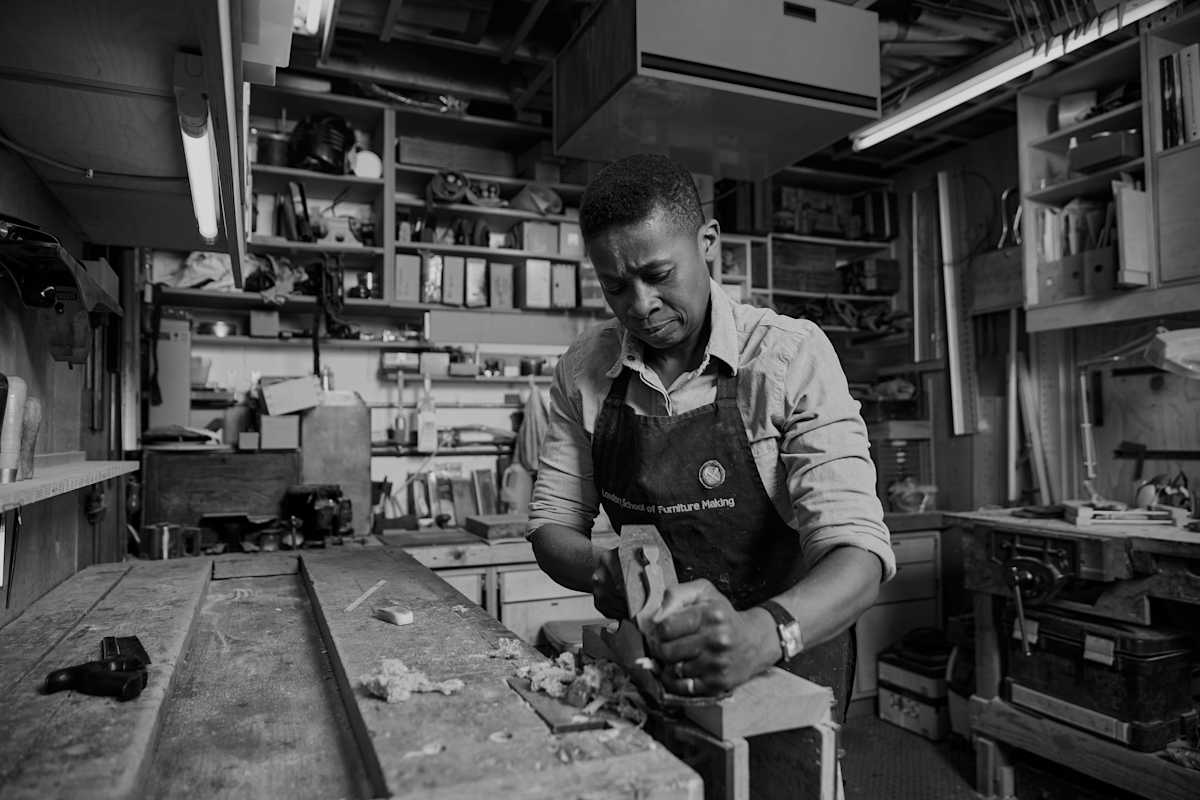Say hello to Helen Welch, founder of the London School of Furniture Making.
Helen opened the doors to the London School of Furniture Making six years ago. Today, she opens up about how it all started and what it’s like to be her own boss.
Helen started woodworking at the age of 17 after leaving school during her A-levels. “I was struggling, and it was all too hard. But I was lucky enough to fall into woodworking and it’s been a part of my career ever since.”
Helen recalls moving in and out of different things, but says there was always a woodworking connection in there somewhere.
Six years ago, Helen decided that she didn’t want to make furniture for people anymore. She had already been teaching part time at various colleges around London and since she had the workspace – the next logical step was to start her own school.
I thought to myself, I’ll see if it works and if it doesn’t, I’ll just move on to the next thing. But I had a feeling that one way or another, it was going to work.
It all started when a close friend asked her to do a class for someone that was keen on woodworking. It would have been a one-off but it never ended up happening. But it got Helen thinking, and she realised that it could actually work. So she put the word out to some of her existing students, put on an evening class – and a couple of them showed up.
It went on for a few weeks until a third person joined. It didn’t take long to move from a one-day class to three-day classes before it turned into a five-day endeavour.
I eventually scaled back on evenings and weekends as I have someone who works for me who teaches when I don’t want to. So I do the day classes and he does evenings and weekends.
What a typical day looks like
A typical day for Helen starts at 8:30 where she heads into the workshop and prepares the workspace for whoever is coming in. It changes depending on the class – if it’s a formal class she’ll machine some timber and set out the tools.
“In the morning, there is an awful lot of me talking and gesticulating, pointing and explaining things to people, which calms down around lunch time. In the afternoon, sessions tend to run with students getting on with stuff themselves – where I point out if things haven’t gone quite right or explaining a new technique. At 4 o’clock I wave everyone out the door – chat away to colleagues (others I share the workspace with) then cycle home.”
What sets the LSFM apart
“It’s not just about taking in an experience, it’s about teaching people the skills they should have if they want to become competent woodworkers.”
Helen’s technique focuses on traditional hand tools, so there’s not a lot of machine work going on. She offers a set of modules – students can choose to take one or all of them. And there are nine core skills that run from ‘Joinery’ through to ‘Finishing’.
The school makes time during the week for people to come in if they want to make something – Helen will help them through the process.
“We have five different projects for people who either have experience or have been to a few classes so they can come in and build a table or a box etc. If that doesn’t interest them, they can always make their own projects.“
While most classes are short, self made projects can go on for some time – years even. Helen describes seeing some projects in their early stages, “I initially think that it will take a few months, but one or two years later, people can still be working on it”.
This is mainly because people come in when they can – either once a week or once a month, so the process can be slow. “I need to build in flexibility for that and not say no, as there other places people can go. So part of the process is being generous with my space.”
But it’s rewarding Helen describes, as students always go home with something that looks fantastic as they will have worked really hard.
I know the effort that students put in – most people come here with very little, to no skill. I’m proud of all projects with students because they look like real furniture. I think they’re all generally amazing. Mainly because I know the effort that’s put into it.
Her favourite piece
It’s been a while since she’s made a piece from start to finish. Looking back, there isn’t one particular piece that she is most proud of. “The one I’m most proud of is one that I am working on or have just finished.”
In the last few years she’s worked on some really interesting projects with people, notably a series of 10 oak ottomans that she made for a client who wanted to create spare seating and a bed if necessary.
Running her own business
Running the business has been quite easy, Helen admits. It’s more than she ever thought it would be. “I enjoy that I have carte blanche over how my day is run – I decide my week, I decide which day I’m going to teach and what I’m going to teach. Who I get to teach I don’t choose but that’s not a problem because everyone that comes in is really lovely and interesting. I love it.”
This also means that she has a more structured week than when she was making furniture for people. There was always a deadline, things could run late into the evening, or run across weekends and she could fall behind.
This is much better, I can really plan my week, have a home life and have weekends that don’t involve being in the workshop.
And while that’s relaxing, it doesn't mean she’s not busy working at home doing some kind of paperwork, tinkering with the website, advertising or writing something – she doesn’t tend to switch off, it just means she’s doing something different, but more containable.
The tough part...
“Saying no to someone is the most challenging part of my business.” Although her teaching style is relaxed, there are things that she needs to get across to her students such as the workshop’s rules and terms and conditions of the business.
One of the most difficult things she found was not knowing anything about creating and developing a website.
”I didn’t have enough spare cash to get someone to do it so I had to learn. Unfortunately, it looked rubbish for years. But when I learned something new, I would go back and fiddle with it to make it look less amateurish. Surprisingly, even though it never looked good, it did bring people in, so it was effective.”
She’s also struggled with the accounting side of things while trying to keep things up to date. “Not knowing when money is going to come in and when its going out, and being able to cross reference receipts and outgoings in the account with other sources – it can be difficult to do that.”
“When money comes into my account, I’d like it to show up immediately. I like to know what money is going out today and going out tomorrow. This is a much bigger help than an app that just justifies what you do.”
But, other than the satisfaction she gets from her students, what she loves most is not having to answer to anybody else.




